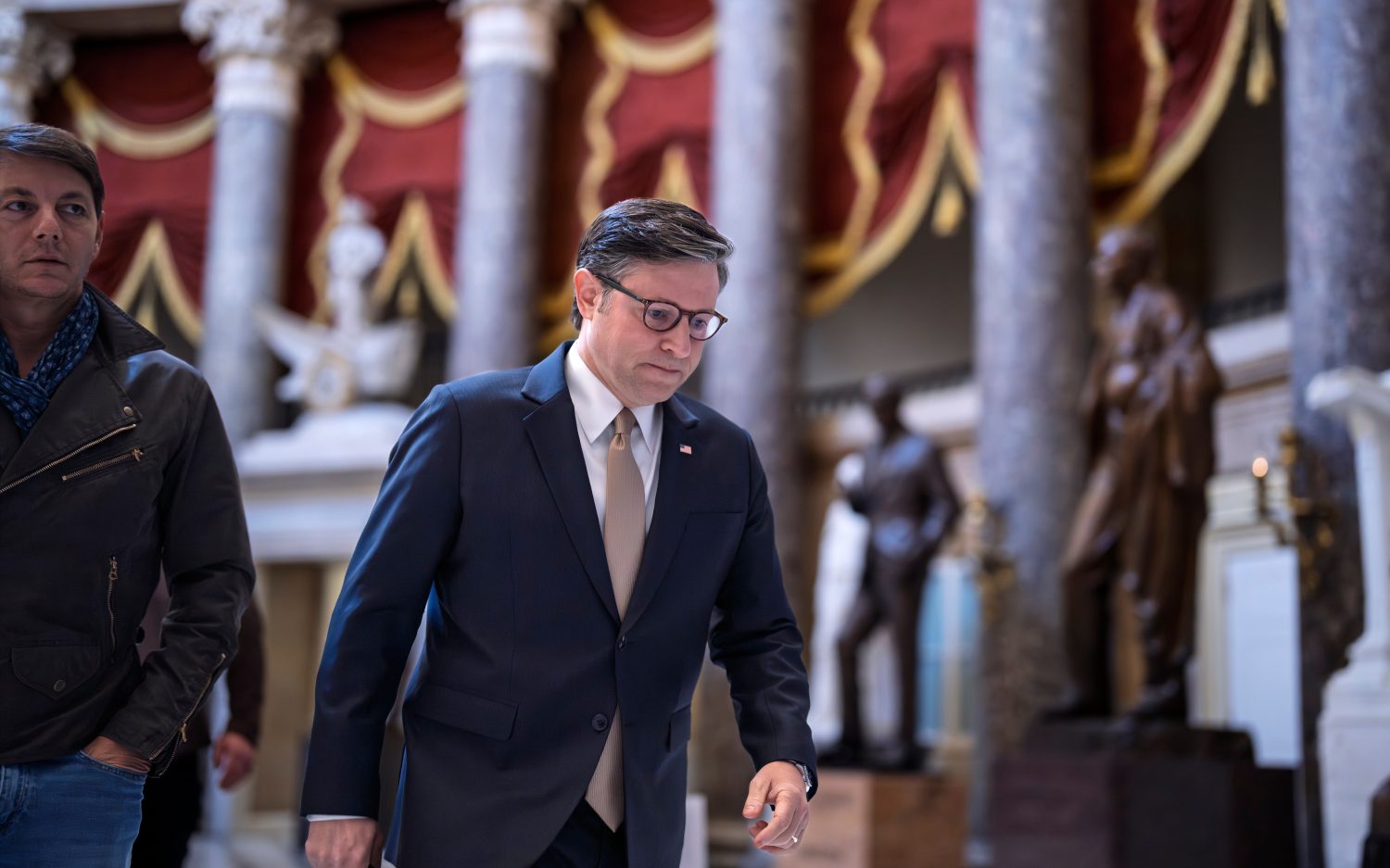The D-word is coming to a campus near you
Colleges continue to kick Christian clubs off campus for ‘discrimination’ in leadership
“We engage in education, not discrimination.”
That’s how an attorney for the California State University system put it, in explaining to InterVarsity Christian Fellowship why 23 of its student clubs on 19 California campuses this fall have been formally “derecognized” by the state’s public university system.
For the first time this semester, all California State University campuses, serving 391,000 undergrads and 55,000 grad students, have formally embraced what the Supreme Court in 2010 called an “all-comers policy.” The state’s rule requires that every student club be open to every student, in both membership and leadership.
That’s hard news for Christian student clubs, which require of their leaders “personal faith in Jesus Christ” and a commitment to abstain from sex until marriage.
Yet California’s decision joins a growing chorus of others: In recent years, Christian fellowship groups on campus have been stripped of official university standing at Tufts University, Bowdoin College, Rollins College, State University of New York, and Vanderbilt. In practice, this means faith-based student-led clubs have lost access to campus rooms for meetings, the opportunity to participate in student activity fairs, and the overall campus legitimacy enjoyed by other student clubs—including the ability to apply for student activity funds.
At odds on these campuses, as a banner New York Times story describes, is a fundamental question about where bias begins and ends.
A changing landscape
In principle, the debate should affect far more than Christians, since a Students for a Democratic Society chapter must now be open to electing a Republican student as its leader, or a Women’s Engineering Association must allow a male student to stand for its presidency. As a recent Atlantic piece recounts, the only exception on California public campuses is gender-based discrimination for dorm life (although in a stunning display of equality, Wesleyan University has just abolished even this principled exception, requiring all its fraternities to be open to women).
All this begs a deeper question: Where do legitimate limits of “sameness” end? In campus life—or public life, for that matter—what makes for healthy diversity? If universities are one of our foremost training grounds for citizenship, and if their purpose is not only to prepare students to earn a living but also to live well amidst a diverse democracy, how should we view a mandate toward a more sanitized, monolithic brand of student club leadership?
At their best, the new university rules aim to create safer, more welcoming spaces for homosexual students who have historically felt discriminated against, especially by traditional expressions of religion. Advocates of these changes are doing what they can to minimize exclusion or rejection of gay students, and increasingly, this dynamic is affecting Christian colleges as well as secular schools.
But are smaller religious campuses implicated, too? Just last week Gordon College, a non-denominational evangelical school on Boston’s North Shore that prohibits “homosexual practice” in its campus-wide behavioral standards, announced it is forming a committee to carefully review the school’s policies. This comes just after the New England Association of Schools and Colleges questioned whether Gordon’s prohibition—quite common among Christian colleges that prohibit sexual relationships outside of marriage—is contrary to contemporary university practices. These accreditation concerns are menacing, and early coverage suggests they could be on the march.
Interestingly enough, this new policy may harm the university’s aim of serving minority students in a more welcoming way. On California’s public campuses, for instance, a majority of students come from minority backgrounds: 33 percent are Latino, 16 percent are Asian, and 5 percent are black. But as Virginia Postrel points out, many of these very students have discovered an oasis and a sense of solidarity in joining faith-based student clubs. By derecognizing those clubs via the “all-comers” policies, school officials may actually ostracize the very students the new rules are purporting to help.
And yet this year, in the name of diversity and multiculturalism, these clubs are being disbanded.
Ironically, InterVarsity and similar clubs such as Cru (formerly Campus Crusade) are open to non-Christian students. InterVarsity’s president recently noted that more than 25 percent of its participating students are non-Christians. Yet to be who they are, these evangelical Christians require freedom to elect club leaders who commit to basic biblical standards.
Because their view of sexuality is at odds with the university’s new code, and because these students aren’t compromising on the basic right to elect leaders who share their faith views, these clubs are now perceived—as the California State University lead attorney put it—to be engaging in “discrimination, rather than education.”
The problem is that this policy resolution fails to appreciate real differences inherent to human life. Professors and students have unique roles. Men and women differ, and on any campus a wide array of clashing religious, economic, political, and cultural worldviews are in fact held by students, professors, administrators, and board members.
So even if, say, campus culture or attitudes among millennials are changing, does enacting a new one-size-fits-all policy that disavows principled differences best serve today’s students?
The real question is whether the diversity we affirm and practice should be comprised of thin tolerance (that is, tolerance that minimizes inherent worldview differences), or thick tolerance (that is, tolerance that takes deep differences seriously and welcomes their involvement in common life). If it’s the former, California State University and other similar university policies can be cheered; if it’s the latter, real trouble lies ahead, as religious liberty and free speech are increasingly undermined in campus life.
The outcome in this debate concerns far more than sexual identity or behavioral ethics; it concerns how we think about free speech. In our own on-campus work with students, the American Enterprise Institute believes that “the competition of ideas is essential to a free society.” Similarly, our Christian college partnerships with faculty provide course readings from multiple vantage points, and material that complements existing coursework precisely because we believe student learning is always richest when it happens in liberty.
A path forward
That’s why it’s tragic, in California and elsewhere, to see learning environments stamping out some of their most vibrant sources of intellectual freedom. In these settings, it may be that sunlight is the best disinfectant, as the old adage goes. This year will bring new opportunities to catalogue or highlight the implications of official derecognition for faith-based clubs. The outcry against these new policies will perhaps be strongest when it is multi-faith and grassroots: When evangelical, Catholic, Jewish, and/or Muslim students can band together, their voice will be stronger than when student groups act alone.
Moreover, Christian students can model their appreciation for true diversity and pluralism by honoring not only other faith groups but also their LGBTQ student peers as true equals in university life—not by agreeing with their lifestyle, but by affirming their right to free speech, free association, and basic rights that any campus group should enjoy. Respecting those from other walks of life means learning from others how differing beliefs play out in university life, and engaging with peers in a manner that has nothing to fear from a robust competition of ideas.
For those with legal expertise, it may be that working to pass state-by-state legislation is today a wiser tactic than pursuing federal legislation or a new Supreme Court ruling. States like Alaska, Arizona, Indiana, Ohio, Oklahoma, North Carolina, and Tennessee, which have recently passed basic protections for religious liberty on campuses, can be studied as examples.
Yet at the end of the day, the courts may be a less hopeful source of protection for thick pluralism than popular opinion, which is still largely uninformed on this issue of campus access and free speech. Most of us still tend to think of universities as hip and cool, centers of youth and freedom—not places that could someday soon be considered “fascist.”
In a less optimistic move, Christian donors may also be wise to purchase new property adjacent to top schools, so as to provide a safe refuge for students to meet in non-university buildings. Christian Study Centers and the James Madison Program at Princeton University provide some noteworthy examples.
The reality is that on a growing number of campuses, as one Vanderbilt student leader recounts, becoming “the wrong kind of Christian” is today far easier than it used to be. That fact makes it our job to pay attention—and to work from an array of competencies toward a richer kind of tolerance and a healthier form of campus freedom than recent trends portend.
An actual newsletter worth subscribing to instead of just a collection of links. —Adam
Sign up to receive The Sift email newsletter each weekday morning for the latest headlines from WORLD’s breaking news team.




Please wait while we load the latest comments...
Comments
Please register, subscribe, or log in to comment on this article.